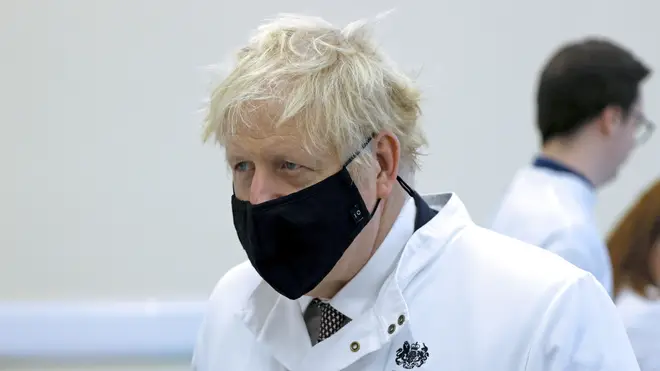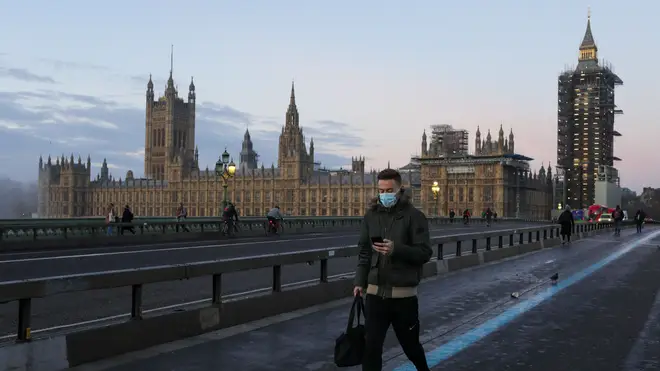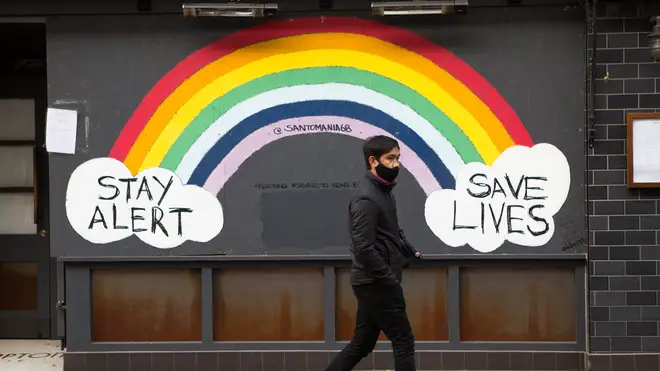
Henry Riley 4am - 7am
28 November 2020, 08:18 | Updated: 28 November 2020, 08:34

People in England could be banned from socialising indoors together until April, as a Tory rebellion grows against the Government's coronavirus tier system.
It was announced on Thursday that 99% of the country would be placed into the top two tiers of coronavirus restrictions, banning anyone from socialising indoors with someone outside their household or support bubbles.
But the move - which meant only the Isle of Wight, Isles of Scilly and Cornwall were placed into Tier 1 - has angered Tory backbenchers, who argue the measures will affect small businesses in their constituencies.
There is hope that a vaccine for Covid-19 will be rolled out on a large scale in January, but senior sources have warned that it will not be until Easter that restrictions will be able to be relaxed.
Read more: New tier system labelled 'unfair' as two thirds of England faces tougher rules
Read more: Covid-19 crisis in numbers: LBC brings you the stats you need to know
A senior government source told Sky News: "This has been the running assumption.
"If you think that vaccines will start going in arms in large numbers at the end of January, it will be Easter by the time life changes properly and there would be restrictions until then.

PM 'understands frustration' of those in Tier 3 restrictions
"The government has also been very clear that the restrictions will go to January and beyond."
Boris Johnson sparked hope that some areas could be moved into lower tiers during a trip to Porton Down research laboratory, saying some could be moved in a planned review of the measures on 16 December.
But Government scientists have warned this is unlikely before Christmas, to avoid another spike in coronavirus cases.
Read more: PM under pressure: Rebellion grows over Covid tough tiers
In Tier 1, the rule of six applies indoors and outdoors but in Tier 2 there will be a ban on households mixing indoors, and pubs and restaurants will only be able to sell alcohol with a "substantial meal".
Tier 3 measures mean a ban on households mixing, except in limited circumstances such as in parks.

It is thought around 70 backbench Tory MP's could be willing to vote against the Government or abstain from next week's vote on the measures.
It would mean the Prime Minister would be reliant on Labour MPs to get his tier system over the line and bring it into force.
Former minister Tobias Ellwood said he would "probably abstain", while former business secretary Greg Clark called on the Government to review its decisions and make more data available before he could vote for them.
Former international trade secretary Liam Fox issued a damning joint statement with neighbouring MP John Penrose, the husband of Test and Trace boss Dido Harding, saying they "cannot agree" with the way Tiers have been allocated in the South West.
"This isn't right or fair," the pair said, "we hope that, at the review point in 14 days time, this methodology can be changed so that North Somerset can be treated on its own merits and so hardworking local businesses aren't punished because of higher infection rates in Bristol."

On Friday evening Cabinet Office minister Michael Gove intervened with a piece written in the Times, calling on rebellious MPs to "take responsibility for difficult decisions" to stop the spread of the virus.
In the article, he warned that every hospital in England could be overwhelmed with Covid-19 patients if the new tier restrictions are not introduced.
On Friday the PM was similarly forced to defend the measures, but acknowledged why people might be "frustrated" - particularly if they were in an area with low infection rates.
Read more: Public Health England reveals high-priority list for Covid-19 vaccine
"I know it is frustrating for people when they are in a high-tier area when there is very little incidence in their village or their area. I totally understand why people feel frustrated," he said during a visit to a public health laboratory in Wiltshire.
"The difficulty is that if you did it any other way, first of all you'd divide the country up into loads and loads of very complicated sub-divisions - there has got to be some simplicity and clarity in the way we do this.
"The second problem is that, alas, our experience is that when a high-incidence area is quite close to a low-incidence area, unless you beat the problem in the high-incidence area, the low-incidence area I'm afraid starts to catch up."